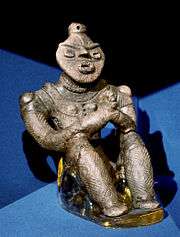List of Cultural Properties of Japan - archaeological materials (Kumamoto)
This list is of the Cultural Properties of Japan designated in the category of archaeological materials (考古資料 kōko shiryō) for the Prefecture of Kumamoto.[1]
National Cultural Properties
As of 1 February 2015, four Important Cultural Properties have been designated, being of national significance.[2][3]
| Property | Date | Municipality | Ownership | Comments | Image | Coordinates | Ref. |
|---|---|---|---|---|---|---|---|
| Boat-Shaped Earthenware Vessel with Foot 台付舟形土器 dai tsuki funagata doki | Yayoi period | Kumamoto | Kumamoto Tsukahara Museum of History and Folklore (熊本市塚原歴史民俗資料館) | 32°41′32″N 130°44′15″E / 32.69211517°N 130.73761771°E | |||
| Excavated Artefacts from the Aso Family Hama-no-gosho Site, Higo Province 肥後阿蘇氏浜御所跡出土品 Higo Aso-shi Hama-no-gosho ato shutsudo hin | Ming dynasty | Kumamoto | Kumamoto Prefectural Museum of Art | 32°48′27″N 130°42′02″E / 32.80749015°N 130.7005379°E | |||
| Excavated Artefacts from Higo Mukōnoda Kofun 肥後向野田古墳出土品 Higo Mukōnoda kofun shutsudo hin | Kofun period | Uto | Uto City | 32°41′09″N 130°39′27″E / 32.68588652°N 130.65745226°E | |||
| Excavated Artefacts from Mendasaizon Kofun, Kuma District, Higo Province 肥後国球磨郡免田才園古墳出土品 Higo-no-kuni Kuma-gun Mendasaizon kofun shutsudo hin | Kofun period | Kumamoto | Kumamoto Prefectural Museum of Art | 32°48′27″N 130°42′02″E / 32.80749015°N 130.7005379°E | |||
Prefectural Cultural Properties
Properties designated at a prefectural level include:
| Property | Date | Municipality | Ownership | Comments | Image | Coordinates | Ref. |
|---|---|---|---|---|---|---|---|
| Excavated Artefacts from Ōya Site 大矢遺跡出土品 Ōya iseki shutsudo hin | Jōmon period | Amakusa | Hondo Museum of History and Folklore (本渡歴史民俗資料館) | 32°27′39″N 130°11′55″E / 32.460783°N 130.198642°E | |||
| Tsumanohana Tumulus Cluster and Collection of Excavated Artefacts 妻の鼻墳墓群及び出土遺物一括 Tsumanohana funbo-gun oyobi shutsudo ibutsu ikkatsu | C6 | Amakusa | Hondo Museum of History and Folklore (本渡歴史民俗資料館) | 32°27′39″N 130°11′55″E / 32.460783°N 130.198642°E | |||
| Kikōji Stone Man 木柑子石人 Kikōji sekijin | Kikuchi | height of 109 centimetres (3.58 ft) | 32°56′35″N 130°47′10″E / 32.943068°N 130.786142°E | ||||
| Excavated Plant Remains from Sōbatake Site 曽畑遺跡出土植物質資料 Sōbatake iseki shutsudo shokubutsu-shitsu shiryō | Jōmon period | Kumamoto | Kumamoto Prefectural Board of Education (kept at the Prefectural Cultural Property Study Room (県文化財資室)) | 32°48′22″N 130°44′19″E / 32.806074°N 130.738544°E | |||
| Chinese Iron Glazed Jar 磁州窯系鉄絵壺 Jishū-yōkei tetsu-e tsubo | C12-14 | Kumamoto | Kumamoto Prefectural Board of Education (kept at the Prefectural Cultural Property Study Room (県文化財資室)) | 32°48′22″N 130°44′19″E / 32.806074°N 130.738544°E | |||
| Bandō-ji Sutra Container 凡導寺の経筒 Bandōji no kyōzutsu | 1145 | Yamaga | Kamō District (kept at Yamaga City Museum (山鹿市立博物館)) | 33°01′25″N 130°40′00″E / 33.023741°N 130.666559°E | |||
| Usutsuka Stone Man 臼塚石人 Usutsuka sekijin | Kofun period | Kumamoto | Kumamoto Prefecture (kept at Kumamoto Prefectural Museum of Art) | height of 2 metres (6.6 ft) | 32°48′27″N 130°42′02″E / 32.80749015°N 130.7005379°E | ||
| Excavated Artefacts from Katōda Higashibaru Site 方保田東原遺跡出土品 Katōda Higashibaru iseki shutsudo hin | Yayoi period | Yamaga | Yamaga City (kept at Yamaga City Museum (山鹿市立博物館)) | 139 items, including objects of bronze, iron, and shell, and ceramics | 33°01′25″N 130°40′00″E / 33.023741°N 130.666559°E | ||
See also
- Cultural Properties of Japan
- List of National Treasures of Japan (archaeological materials)
- List of Historic Sites of Japan (Kumamoto)
- List of Cultural Properties of Japan - historical materials (Kumamoto)
- Higo Province
References
- ↑ "Pamphlet on Cultural Properties". Agency for Cultural Affairs. Retrieved 5 February 2015.
- ↑ 国宝・重要文化財 [Number of National Treasures and Important Cultural Properties by Prefecture] (in Japanese). Agency for Cultural Affairs. 1 February 2015. Retrieved 5 February 2015.
- ↑ "Database of National Cultural Properties: 国宝・重要文化財(美術品)(考古資料 熊本県)" (in Japanese). Agency for Cultural Affairs. Retrieved 5 February 2015.
This article is issued from Wikipedia - version of the 12/19/2015. The text is available under the Creative Commons Attribution/Share Alike but additional terms may apply for the media files.
